"I hate hearing low-quality recordings from amazing bands. It hurts my heart," says Aaron Schroeder, the one-man dynamo behind BLDGs (pronounced "buildings," for those of us who value vowels), a recording studio on Minor Avenue that shares property with Re-bar and has probably recorded at least one of your favorite bands.
Schroeder is a super-friendly ex-Texan who learned the art of recording in Austin before making his way to Seattle about five years ago. "I went to recording school for a year and a half, and ended up getting a job at Willie Nelson's studio," he explains, as we sit on the comfortably worn couch in what serves as the BLDGs living room. "I started off as an intern, getting coffee mainly, until an engineer got sick from doing too much blow and didn't show up for a session," he laughs. "So I got to do it." He went on an eight-month tour with Willie Nelson, recording the sets live, which led to other unreal adventures. "I even did three months on the road with Matchbox Twenty—on that tour, I got to booty dance with Alanis Morissette... she's tiny, it freaked me out."
When Schroeder first got to Seattle, the BLDGs building was a studio for Sarathan Records—a small label that put out recordings by bands like Feral Children and the Purrs—which had been languishing as a seldom-used practice space. "The owner occasionally let me record my own bands here, but I kept telling him that he should let me run the space as a studio," Schroeder says. "It took him about a year to warm up to that idea—he was nervous, I think, to let a bunch of punks be around his gear." When he got the green light two years ago, Schroeder named his operation BLDGs ("No matter where the studio is, if it ever has to move, the idea is that BLDGs can be anywhere... it's always going to be in a building") and set out to make your band sound good.
Though Schroeder has recorded everything from death metal to hiphop (and would still like to), most of the bands that have come through BLDGs are of the garage and punk variety. "The way that the studio has grown, I can relate everything back to the very first recording I made here, which was Charles Leo Gebhardt IV," Schroeder remembers. "I was brand-new in Seattle and I saw Leo play at the Comet. I was wasted," he laughs. "I told him I would record his stuff for free." He recorded Leo's first two albums and has steadily branched out from there by word of mouth—bands like Wimps, MTNS., Unnatural Helpers, Ubu Roi, and Telemesser have all recorded at BLDGs in the past few months. "The most fun I've had recently was working with Telemesser, because they're really into the whole mixing process, very much into experimenting. I got to do lots of delays, reverb, and weird compression techniques—it was nice to stretch out."
The BLDGs space is laid-back and welcoming—beads, animal-themed tapestries, and clouds painted on the walls, paired with gigantic mixing boards, make it feel like a Star Trek episode got mixed with the Reality Bites apartment. In the recording room, instruments line every wall: Giant bundles of neatly wound cords hang from a coat rack like an exotic tree, guitars, keyboards, and amps neatly fill the space, and a sparkly silver drum kit winks from the corner. Schroeder gives me a tour, stopping to demonstrate a cheap-looking organ. "This is my favorite thing. It's called an Optigan—I've only ever gotten to use it on one song." He holds up a celluloid disc accented with squiggly rings and explains that they're prerecorded sound waves. "It's read with light optics, and there are little shutters in there. When you press a key down, a shutter opens up, thus creating the sound." He feeds a disc into it and grins as an eerie, old-timey song comes warbling out.
Schroeder finds himself at the studio five days a week or more, but he still holds a part-time job at a toy store in Pike Place Market. "It's getting pretty busy. Eventually, I'm hoping to make this the only thing I do," he says. Rent is pricey at BLDGs, and Schroeder's rates have increased a bit to keep up, but it's still one of the most accessible options most musicians in the area will find. "I'm offering a two-days-for-the-price-of-one deal through the end of March to get some new bands in here," he smiles, leaning in to speak directly into my interview recorder. "It's. A. Deal." And for a city with a new band lurking around every corner, I can attest—go ahead and get some solid recordings out there! Do you know how hard it is for critics to write about your lovely tunes based on shaky YouTube videos alone? ![]()



















